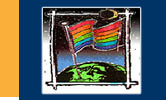
 |
 |
||
Saskatchewan Resources for Sexual Diversity
Memoirs — Wes FunkRock and Roll Saved my Life and Fat Boy
1) Rock and Roll Saved my Life It’s true—for a lot of my childhood I was quite overweight. Much like now, heavy-set kids in those days got teased. A lot. I didn’t have many friends in my first years of school. Quite often, I was alone. Frankly, I didn’t mind. I was quite capable of entertaining myself. Just like my adult years, I had a wild imagination then too. I could spend hours in a sandbox, sculpting empires or sitting in a swing, reading a book. I’m so glad anti-bullying has become such a huge world-wide movement. I have donated numerous copies of my books to the anti-bullying campaign. As most of us know, bullying can be horrendous and can end with horrific results. In my case, the kid who bullied me the most ended up to be an abused child himself. In the years after I graduated from school, it would come out in the media that he and his sib- lings had suffered unspeakable abuse at the hands of their father. When I was in my twenties and learned of this all, the rage I felt against him fell way—the memories of him pouring pop into my hair and squashing my lunch didn’t boil up my dander any longer. One of the many things I did to amuse myself in those childhood years was adopt a second per- sona—my love of comic books inspired me to carry an alter ego around. Thus, Wonder Wesley was born. I had the mask, the tights and the cowl and often I had myself (and other too, I think) convinced that I was a super-hero. Wonder Wesley with his pink cape (which was once a curtain) often used to prowl around the town of Mayfair and scale rooftops of sheds and garages, protecting the community from evil-doers. I was happy that my parents and older siblings saw nothing wrong with this avenue of my life because I think being Wonder Wesley saved my sanity (a lot). And when I arrived into my mid- thirties, I finally took the real plunge and headed down to a local tattoo shop and had the Wonder Wesley logo inked onto my chest in a striking magenta. When I hit adolescence a miracle transpired. I hit a growth spurt and quite quickly all my fat disap- peared and in a few short weeks, I was suddenly this tall gangly and very skinny youth. The change was not only fast, but life-altering. No longer could the rough and tough bully population of Mayfair taunt and beat me for being a chub. This was dramatically liberating! And even though further hurdles came along (like having really bad acne for a couple years), I found myself carrying a new sense of pride and confidence. Though it didn’t interest me, I was tickled to have the occasional young lady express a ro- mantic interest in me. This was good for the ego and the soul. With puberty came a lot of other things—hormones for one. Coming of age, coming to grips, coming out! I’d known I was gay from quite a young age, but it was only in my early teens that I finally ‘faced’ it. I wrestled with the old-school religious values for about... a week. Then I pretty-much fully embraced my sexuality. At the age of about fourteen, I decided to tell the person I was most closest to—my sister Leila. I was with my parents visiting Leila and her family on their farm just outside of Penzance, Sas- katchewan—she had just given birth to her second child and the family had driven down there to bond with the new baby. It was a warm summer evening and my sister and I decided to head out for a stroll and leave our parents to spend time with their fourth grandchild. The air was sultry and the night was dark and I timidly spilled out this tidbit of information to my sister as we nonchalantly walked down the gravel road that ran past her house. She didn’t have much of a response, but merely shrugged and smiled weakly as she absorbed what was said. This was the manor in which my family always seemed to deal with things—silence. It was a long-running method of handling the world. Generations of Funks dealt with life in this way and I was accustomed to it. In the years to come though, Leila would not only come to accept my orientation, but embrace it. These days, she has many gay friends and has become a huge advocate for diversity. I like to think the ‘silent’ habit is beginning to stop with our generation. |
|||
“There was no iTunes, iPods, or i-Anything Else” |
|||